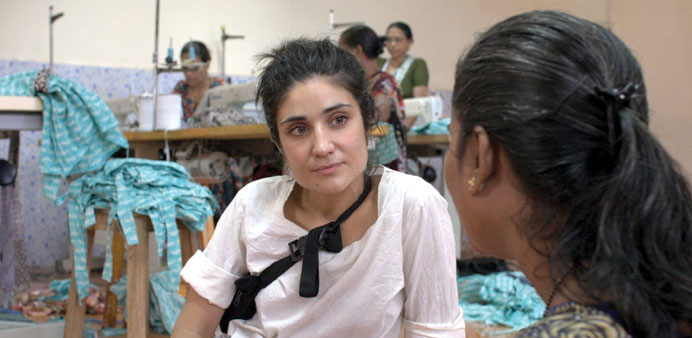* Spanish garment designer Ananda Pascual (centre) in a conversation with a cutter in Mumbai, India. Pacual co-operates with Creative Handicrafts, a welfare organisation in the city promoting ethical trade.
By Alejo Gomez Jacobo
Spanish designer Ananda Pascual defines her fashion firm as “positive” and “ethical”. The firm hires marginalised or at-risk women in Latin America and Asia and these employees receive a decent salary and their working conditions are entirely different from those the deadly collapse of a garment factory in Bangladesh recently brought to light.
“(My company) breaks the rules of the game in the marketplace,” Pascual told in an interview.
Named after its owner, the Ananda Pascual fashion firm stands against a fashion industry system whose dire consequences were seen in the collapse of the multi-storey Rana Plaza building that housed multiple garment factories.
More than 1,100 people were killed, crushed to death in the rubble of the building. Fashion brands such as the Irish Primark and the Spanish Mango have acknowledged they used the Rana Plaza factories for garments for their lines.
In just a year and a half after it was founded, Ananda Pascual has strengthened production of its line of modern futuristic-looking garments, working together with social organisations that employ women in the Mumbai suburbs; Aymara indigenous women in Peru and victims of social exploitation in Cambodia. All employees receive medical insurance and they can turn to social workers for advice.
Pascual, now 33, is a native of La Rioja, in northern Spain but her most vivid memories of childhood have to do with a trip at age 16 to the Sahara. Her father took her and two sisters to visit a refugee camp.
Later, in 2003 and having already obtained her undergraduate degree in education and finished her first year of fashion design at a school in Madrid, she and other students travelled to India. The trip to give fashion design coaching was made at the invitation of Isabel Martin, a nun who founded the Creative Handicrafts organisation, a not-for-profit group that works with women in disadvantaged neighbourhoods.
“It marked a before and an after in the focus of my life,” said Pascual, who was a finalist in the 2012 Source Awards that the Ethical Fashion Forum hands out in London to designers who combine innovation with sustainability.
After her experience in India, Pascual never looked back. She joined Design for Development, a Spanish non-government organisation that advises and trains communities to help them successfully market their handicrafts and she made it her business to learn about the realities of fashion design and production in Brazil, Cambodia, Kenya and Nepal.
But that was not enough. Learning how the fashion world operated demanded that she join the industry “to take the tools and then apply them to other projects”.
Pascual worked for two and a half years for Spanish firms Loewe and Inditex, the clothing empire to which the well-known Zara clothing store chain belongs. “The major fashion firms, including the Spanish ones, have created a machine that needs more and more production so as not to die. “I realised that I did not want to be a part of that inhumane system that is anything but positive. You cannot do aesthetic work at the expense of people’s lives,” she said.
Workers’ groups criticise the big Spanish design houses like Inditex, El Corte Ingles and Mango and the multinational companies that take their production, drawn by the low costs, to Asia, Latin America and Africa.
Workers contend the big companies do not want to be concerned about safety on the job.
“Companies have begun to pay compensation to victims of disasters like the one in Bangladesh, but the problem of exploitation is not solved with money, but with structural reforms,” said Eva Kreisler, spokeswoman for the Clean Clothes Campaign.
Composed of 300 unions all over the world, the campaign stands up for the rights of workers in the garment industry. The Rana Plaza disaster sparked action and the Clean Clothes Campaign together with the IndustriALL Global Union, the UNI Global Union and Worker Rights Consortium moved to establish an Accord on Fire and Building Safety in Bangladesh.
Scores of major retail labels such as H&M, Benetton and Marks & Spencer signed on to the accord, which covers more than 1,000 garment factories in Bangladesh. Spanish companies Inditex, Mango and El Corte Ingles were among the firms that agreed to sign.
Ananda Pascual has for some time now been “matching ethics with attractive products”.
The firm employs 40 women in India, eight in Cambodia and 50 in Peru. The Aymara women in Peru also receive counselling from the Madrid Polytechnic University. The female workers employed through Creative Handicrafts in India and Fair Fashion in Cambodia are paid wages that are higher than the minimum in their countries.
The women in Peru work in agriculture as their main source of income and they do weaving for Ananda Pascual in their spare time. The garments produced for Ananda Pascual are sent to a warehouse in Madrid and then delivered to clients in Spain or other countries.
Ananda Pascual apparel is occasionally on sale in fashion fairs and in shops, but it does most of its business over the Internet, exhibiting its products on its web page ( http://www.anandapascual.eu).
Owner Ananda Pascual is convinced that if all the participants in the production process receive more, then the effects of the ethical approach are more enduring.
“Because this is fair trade, the benefits are shared out with greater balance throughout the productive chain. To raise greater consciousness we must send out a positive message to people,” she said. – DPA

